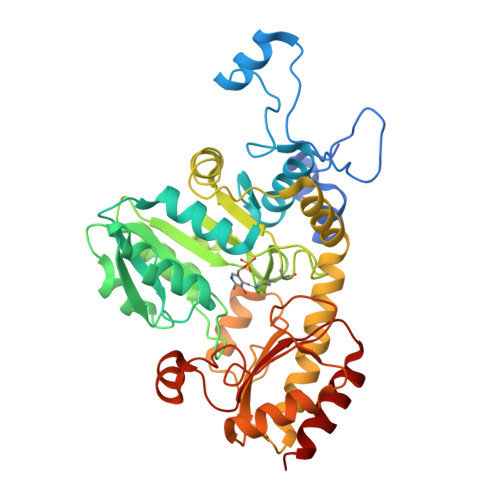The methioninase from the alkalithermophile Thermobrachium celere possesses suitable properties for treatment of cancer.
Ferchaud, N., Kopecny, D., Perina, M., Boyer, A., Hentati, S., Pontoizeau, C., Desterke, C., Krystof, V., Machover, D., Briozzo, P.(2025) Int J Biol Macromol 330: 147876-147876
- PubMed: 41005402
- DOI: https://doi.org/10.1016/j.ijbiomac.2025.147876
- Primary Citation of Related Structures:
9QM6 - PubMed Abstract:
L-Methionine deprivation for cancer treatment requires pyridoxal 5'-phosphate (PLP)-dependent L-methionine γ-lyases (MGL) with sustained activity in plasma. We investigated the MGL from the alkaliphilic thermophile Thermobrachium celere (TcMGL), which was compared to that from Pseudomonas putida (PpMGL) as a reference. Catalysis was limited to L-methionine, L-homocysteine, and L-cysteine, with highest catalytic efficiency towards L-methionine. Binding of apo-TcMGL to PLP results from an endothermic entropy-driven process, contrasting with apo-PpMGL that binds to cofactor following an exothermic enthalpy-driven reaction, as demonstrated with isothermal titration calorimetry. The tetrameric crystal structure of TcMGL revealed a mobile domain adopting open and closed conformations, regulating access of substrate and PLP to the active site. TcMGL exhibited great stability in human plasma in vitro. Half-life of the active enzyme increased from 9.2 h to 66.7 h with increasing PLP concentration, in much greater magnitude than that of PpMGL. Two-way ANOVA demonstrated a highly significant effect on half-lives of enzyme type and PLP concentration. The enzyme eliminated L-methionine from human plasma and exerted potent cytotoxicity against human carcinoma cells in vitro. TcMGL favourable characteristics make it a suitable candidate for treatment of cancer.
- University Paris-Saclay, INRAE, AgroParisTech, Institute Jean-Pierre Bourgin for Plant Sciences (IJPB), 78000, Versailles, France.
Organizational Affiliation:



















